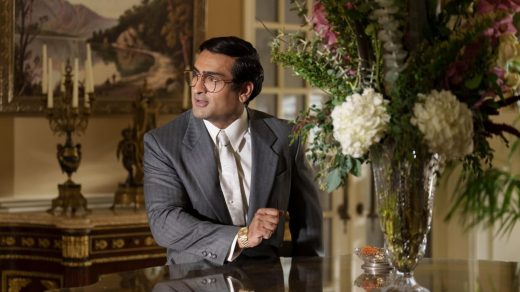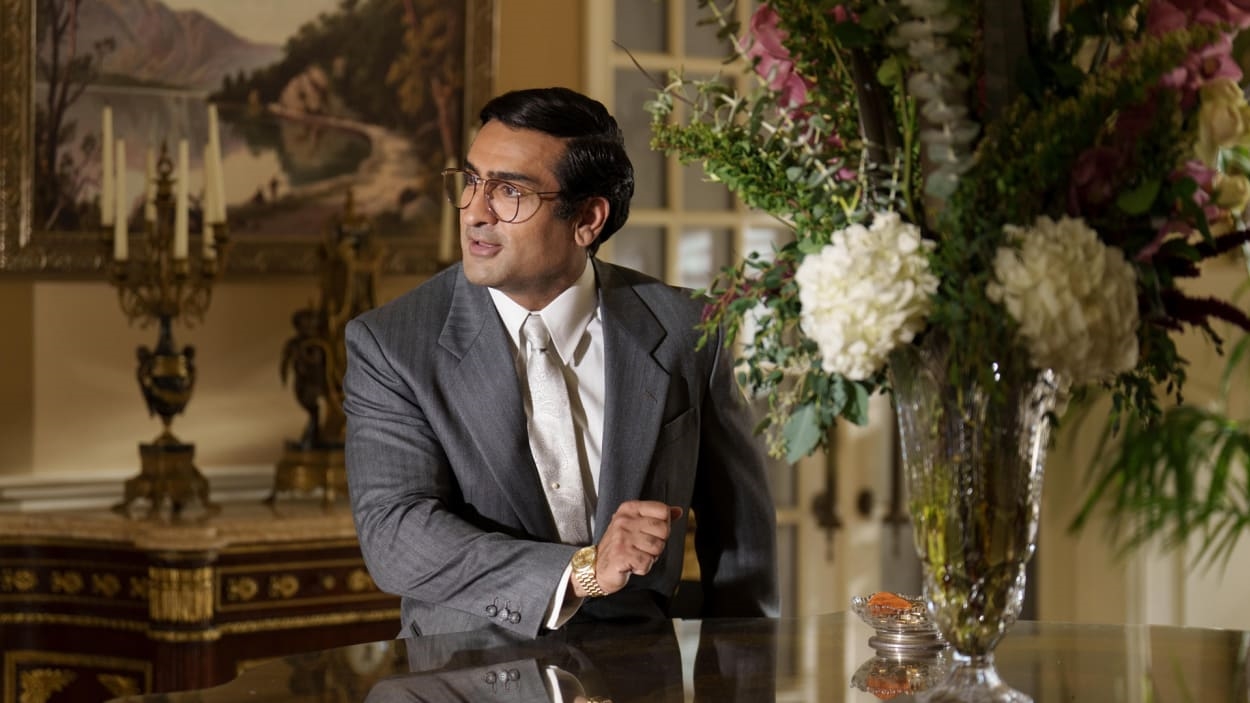Kumail Nanjiani on being present, trusting yourself, and embracing chaos
Don’t get too comfortable with how you perceive Kumail Nanjiani—chances are he’s already plotting his next pivot.
Nanjiani broke into Hollywood out of the stand-up comedy circuit and has made a concerted effort to push past whatever expectations (or rather limitations) one might have for a Pakistani-American comedian. He’s proven his leading man potential in The Big Sick and The Lovebirds. He practically broke the internet when he unveiled his jacked physique in the run-up to starring in Marvel’s The Eternals. And most recently, he tackled his biggest challenge to date in Hulu’s true crime series Welcome to Chippendales.
Nanjiani starred as Somen “Steve” Banerjee, the founder of the all-male revue that rose to massive heights in the ’80s but became shrouded in corruption and murder. Welcome to Chippendales, which had its finale this past week, was the darkest, most dramatic role that Nanjiani’s tackled. So coming off of that experience has given him a new perspective on his career where he’s learning to trust himself more in unfamiliar terrain—and maybe even trusting himself enough to return to where his career began.
Fast Company: We’ve never seen you in a role like Steve before. Does Welcome to Chippendales mark a new era for your career?
Kumail Nanjiani: I don’t know if I look at my career as eras or anything. This is the first time I did something that was completely dramatic. And I got to be darker than I ever have before. So hopefully this allows me more opportunities to play stuff like this. I’m just trying to expand the kinds of things that I do. I want to keep doing comedy. I’m always gonna do that. But I want to now do more dramatic stuff that’s been hard for me to break into until now.
FC: Why has it been hard for you to break into those roles?
KN: There’s a perception of who you are and there’s an inertia behind that. It’s very easy for people to see you as you have been in the past. That’s why it’s so hard to get your first shot, too, because if you haven’t worked, you’re just someone who doesn’t work. One actor who’s been great for 10 years suddenly gets a part and then they’re in everything. Nobody wants to take a chance in this industry. It’s really about breaking perceptions. It takes a lot of work. And it may even take more than one project. Changing people’s perception of you is a complicated thing.
FC: With that in mind, did you have any doubts about starring in Welcome to Chippendales?
KN: I didn’t have doubts. I had concerns. When I finally said yes to it, I trusted myself enough to be able to figure it out as it went. Did I know exactly how the entire arc of the character was going to go? No, I didn’t, because I didn’t have all the scripts. And that was a really great experience because usually I map out the whole thing. When I go into a job, I know exactly every beat. In Silicon Valley, you don’t have the whole season’s scripts going into it. But my character in the first episode is basically my character in the last episode. Something like [Welcome to Chippendales], Steve changes a lot. So I just trusted myself and the people around me and I said, okay, I’m just gonna jump in. I’ve just learned to embrace the chaos and the unpredictability of acting.
FC: When did you learn to trust yourself like that?
KN: Honestly, pretty late. I didn’t really learn to completely trust myself until I did Eternals. It was then that I learned that not knowing exactly how you’re going to do something is an asset. I always prepare a lot, and I have been preparing a lot for years. But sometimes I would get into the trap of trying to re-create whatever version of the scene I had prepared. And in Eternals, because the script was always changing, I was like, I know who this character is—I just have to be completely present and just see what happens. That to me is what trusting myself is. It’s doing the scene, not knowing exactly where you’re going to go, but your body understands this part enough that wherever it goes will feel exciting and truthful. I would stress out about jobs before it, during it—I would just be tight the whole time. With this new approach, I think my work is better. My stress levels are way better. It’s just better in every possible way.
FC: I love that for you. You mentioned that you still want to do comedy even as you continue to branch out into other roles. How are you keeping your comedy skills sharp?
KN: I make jokes in real life often. I’m still always a person who’s trying to find the funny side of things, for sure. When it comes to specific use of the comedy skills like, say, stand-up, that does get rusty—and that is very rusty right now. If I got on stage right now, I don’t know how it would go. I would need a few sets to really get back on it.
FC: Would you want to return to doing stand-up?
KN: I haven’t done stand-up since February 2020. It’s the single toughest challenge. It’s the hardest thing. It’s the thing that falls away first because of everything else on the schedule and stand-up can be whenever you want it to be. In 2020, I was like, this will be the year I get back in the stand-up and do a tour and suddenly the world changed. So I couldn’t do it. But also would I have for sure done it even if we didn’t have COVID? I can’t say that for sure. There were a few years when I was doing stand-up where I felt like I was like, oh, I am good at this. I recorded one special [Beta Male in 2013]. I like the special. I’m proud of it. But I feel like it’s still not me at my best when I was at my best doing stand-up. And I know it sounds a little arrogant, but I’m not at my best right now, so I feel okay saying that a previous version of me was good at something that I am now rusty at.
FC: How rusty is rusty for you? How would you grade your last stand-up set?
KN: I would say that that was probably like a B minus. But it was exactly the type of set that in years’ past would’ve gotten me ravenous to get back on stage again. Like, this line’s not working, but this line’s working, so I need to fix this. That was, to me, always the most exciting part of stand-up. I did this set [in February 2020], and I found part of me didn’t get that same charge from it. Maybe I was too tired then, I don’t know. But I got offstage and usually I would’ve been in my notes and fixing all the jokes immediately. I just put the notes in my pocket and didn’t look at them. I would watch stand-ups who got into acting and they’d stopped doing stand-up. And I was like, I will never be like them. I am always gonna be doing stand-up. And then [laughs] here I am! My last set was well over two years ago, and I don’t have any plans to go do stand-up anytime soon. So I find how easy it is to give it up.
FC: Are you at peace with that?
KN: No! [laughs] Absolutely not! I think about it all the time. You know what I miss the most? I miss loving something that much. I miss how much stand-up meant to me—that very sort of singular passion about ultimately kind of a narrow thing. That’s what I miss. When I was shooting Chippendales, that was my life—and I fucking loved it. But that was five months of my life and that was it. Whereas stand-up was that to me for 15 years. It was the only thing I loved like that. Now I feel like I jump from rock to rock. I fall in love with that rock, and then it’s time to move on to the next rock. Stand-up was the consistent thing I had. So I don’t miss stand-up as much as I miss loving stand-up.
FC: Do you think it’s possible to get that passion back?
KN: I think so. I have to hope it’s possible because I do want to do it again. I don’t shoot anything until March, so I could do stand-up then. But I’m probably a little bit scared of getting back up on stage. So that’s part of it. When I was writing a lot of stand-up, my entire being was devoted to just finding jokes. I’d be walking around being like, oh, that leaf is a weird color. Is that anything? You’re just constantly thinking of things. That’s what it took for me to write material at any kind of decent pace was just constantly thinking about it. And my brain doesn’t think like that right now. So having to shift gears into that is intimidating. And I’m a little bit more known [now]. I think there’s a different expectations of me on stage. But again, maybe these are all excuses and I’m lazy. It’s so satisfying to be able to do this dramatic stuff. It gives me such a charge. But the simplistic joy of just for these next 40 minutes I just have to be as funny as I can possibly be, I miss that.
(24)



